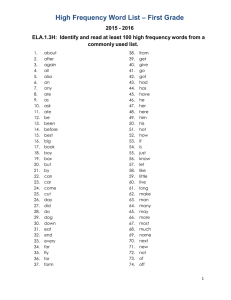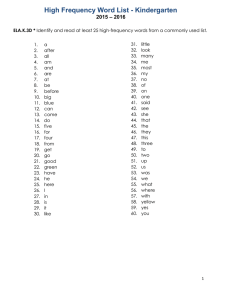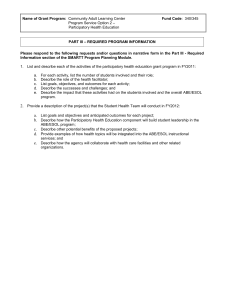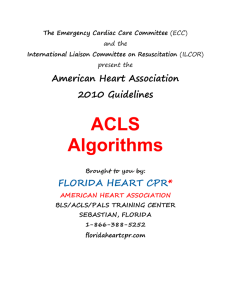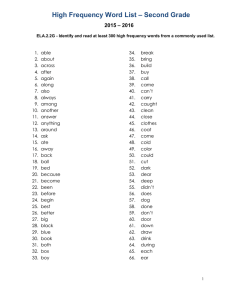Massachusetts Department of Elementary and Secondary Education
advertisement
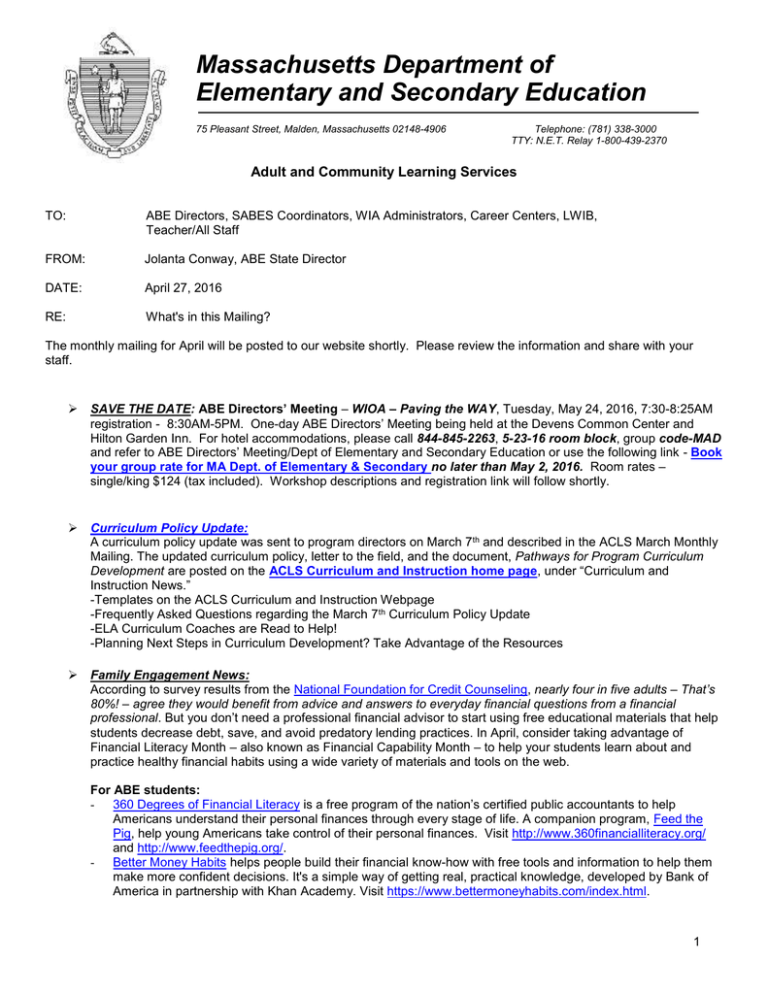
Massachusetts Department of Elementary and Secondary Education 75 Pleasant Street, Malden, Massachusetts 02148-4906 Telephone: (781) 338-3000 TTY: N.E.T. Relay 1-800-439-2370 Adult and Community Learning Services TO: ABE Directors, SABES Coordinators, WIA Administrators, Career Centers, LWIB, Teacher/All Staff FROM: Jolanta Conway, ABE State Director DATE: April 27, 2016 RE: What's in this Mailing? The monthly mailing for April will be posted to our website shortly. Please review the information and share with your staff. SAVE THE DATE: ABE Directors’ Meeting – WIOA – Paving the WAY, Tuesday, May 24, 2016, 7:30-8:25AM registration - 8:30AM-5PM. One-day ABE Directors’ Meeting being held at the Devens Common Center and Hilton Garden Inn. For hotel accommodations, please call 844-845-2263, 5-23-16 room block, group code-MAD and refer to ABE Directors’ Meeting/Dept of Elementary and Secondary Education or use the following link - Book your group rate for MA Dept. of Elementary & Secondary no later than May 2, 2016. Room rates – single/king $124 (tax included). Workshop descriptions and registration link will follow shortly. Curriculum Policy Update: A curriculum policy update was sent to program directors on March 7th and described in the ACLS March Monthly Mailing. The updated curriculum policy, letter to the field, and the document, Pathways for Program Curriculum Development are posted on the ACLS Curriculum and Instruction home page, under “Curriculum and Instruction News.” -Templates on the ACLS Curriculum and Instruction Webpage -Frequently Asked Questions regarding the March 7th Curriculum Policy Update -ELA Curriculum Coaches are Read to Help! -Planning Next Steps in Curriculum Development? Take Advantage of the Resources Family Engagement News: According to survey results from the National Foundation for Credit Counseling, nearly four in five adults – That’s 80%! – agree they would benefit from advice and answers to everyday financial questions from a financial professional. But you don’t need a professional financial advisor to start using free educational materials that help students decrease debt, save, and avoid predatory lending practices. In April, consider taking advantage of Financial Literacy Month – also known as Financial Capability Month – to help your students learn about and practice healthy financial habits using a wide variety of materials and tools on the web. For ABE students: - 360 Degrees of Financial Literacy is a free program of the nation’s certified public accountants to help Americans understand their personal finances through every stage of life. A companion program, Feed the Pig, help young Americans take control of their personal finances. Visit http://www.360financialliteracy.org/ and http://www.feedthepig.org/. - Better Money Habits helps people build their financial know-how with free tools and information to help them make more confident decisions. It's a simple way of getting real, practical knowledge, developed by Bank of America in partnership with Khan Academy. Visit https://www.bettermoneyhabits.com/index.html. 1 - MyMoney.gov is a product of the Financial Literacy and Education Commission, made up of more than 20 federal entities working to strengthen financial capability and increase access to financial services for all Americans. Visit http://www.mymoney.gov/Pages/default.aspx. For families: - Money as You Grow was selected by the American Library Association as a great website for kids. It offers age-appropriate financial lessons with corresponding activities. Written in down-to-earth language, Money as You Grow helps give kids with the knowledge they need to live fiscally fit lives. Visit http://www.consumerfinance.gov/money-as-you-grow/. - A Day at Dollar General was developed by the National Center for Families Learning and the Dollar General Literacy Foundation to educate families. A Day at Dollar General helps families start the conversation about money management and makes it fun to learn basic budgeting skills. Visit http://familieslearning.org/interactive_tools/day_at_dollar_general. - Be Money Smart is a financial literacy guide with activities for elementary, middle, and high school learners. From saving an allowance to financing college, children and teens can use Be Money Smart to learn financial literacy skills and grow into financially secure adults. Visit http://www.massliteracy.org/wpcontent/uploads/2015/04/BeMoneySmart.pdf. HSE – Updates and Information: Instructors, do you need help finding resources for your test takers on our website that will assist them in becoming more familiar with the HiSET® exam including test format, content and test preparation? A Roadmap for Instructors (PDF) is a new resource designed to help instructors guide test takers through available resources that will help them do their best on the HiSET exam. Licensure Update: -To improve the efficiency and validity of the portfolio evaluation process, all licensure candidates will need to submit a videotaped teaching demonstration. The Department will no longer accept written evaluations from approved observers. In addition, candidates will need to submit lesson plans using a standardized template provided by ACLS. These changes will go into effect June 1, 2016. Licensure candidates already enrolled in a cohort will continue to follow the current guidelines. However, candidates entering a cohort after May 31, 2016, will need to abide by the revised guidelines which will soon be posted to the Department’s website. -Educator Evaluation Pilot - A Request for Responses (RFR) has been posted on COMMBUYS, the Commonwealth’s procurement record system, seeking ESOL, Math, and ELA experts to serve as members of the ABE Licensure Review Panel. For details, register at https://www.commbuys.com/bso/ SMARTT Update: Posted -Program Plan FY17 Rollover -Cognos Desk Review -Activating User Accounts in SMARTT -Data Lockout and Automatic Exit -What do you know about Educational Functioning Levels (EFLs)? WIOA UPDATE: (attachment-MOU) On March 30, 2016, Governor Baker, signed and submitted the Combined State Plan for the Commonwealth of Massachusetts as required by the Workforce Innovation and Opportunity Act. Please review Attachment C-1: Statewide Partner Memorandum of Understanding (MOU) which includes guidance on developing a local MOU. If you have questions related to developing local MOUs, please send them to localMOU@doe.mass.edu. Your questions will inform state guidance to programs. ACLS will provide additional resources and will dedicate sessions at the Directors’ Meeting on May 24 to support local planning. 2 Curriculum Update, April 2016 Curriculum Policy Update A curriculum policy update was sent to program directors on March 7 th and described in the ACLS March Monthly Mailing. The updated curriculum policy, letter to the field, and the document, Pathways for Program Curriculum Development are posted on the ACLS Curriculum and Instruction home page, under “Curriculum and Instruction News.” Templates on the ACLS Curriculum and Instruction Webpage Templates for developing scope and sequences, unit plans, and lesson plans are available on the ACLS Curriculum and Instruction Resources webpage. Look for them under the appropriate header (i.e., English Language Arts (ELA), ESOL, and Mathematics and Adult Numeracy). Note: On March 23, SABES revised the scope and sequence templates for ELA, ESOL, and Math. These scope and sequence templates were revised to bring greater consistency to the templates across the three content areas; this is particularly true for the ESOL scope and sequence template. Programs do not need to redo scope and sequence work that has already been completed using earlier versions (prior to March 23, 2016) of this template. However, programs should use these revised scope and sequence templates for future work. Frequently Asked Questions Regarding the March 7th Curriculum Policy Update Seventeen curriculum policy questions, received over the last month, are answered in the document, Frequently Asked Questions Regarding the March 2016 Curriculum Policy Update. This document is available on the ACLS Curriculum and Instruction webpage under the header, “Frequently Asked Questions.” A new process has been instituted to respond to curriculum questions. Please send curriculum questions to the ACLS Curriculum and Instruction mailbox, curriculumfaq@doe.mass.edu. Questions will be answered within 2 to 4 days of receipt. Requests for feedback on curriculum materials will be acknowledged within 2 to 4 days and to schedule a date for providing feedback. ELA Curriculum Coaches Are Ready to Help! The SABES PD Center for ELA has a cohort of ELA Curriculum Coaches who can come to your program and work with staff on site. Coaches develop partnerships with programs in order to: Help clarify and prioritize needs as programs develop their curriculum according to ACLS guidelines (Scope and Sequence, Unit Plans, Lesson Plans) Address specific topics of concern Set attainable goals for curriculum development work Extend knowledge about standards-based curriculum development and design Answer questions Follow-up on progress as programs work toward goals Provide ongoing support 3 Programs have the following to say in praise of their work with an ELA Coach: “I’m writing on behalf of our ELA/SLA staff to thank you and [the coach] for the terrific coaching session on Saturday. The teachers found it very helpful, noting that he had a great balance between bringing support materials and letting the teachers move in the directions that worked best for them. We very much appreciate the support you have given to us in helping us create/ revise our scope and sequence documents, and inevitably our instruction, to be the best it can be.” “Thank you for arranging for [the coach] to come to the program. She was fantastic! All who were present felt very positive about her guidance, and we feel confident that we can accomplish the revisions to our scope and sequence.” ACLS strongly encourages you to hire a coach—at no charge to your program—who can help support your curriculum development! Planning Next Steps in Curriculum Development? Take Advantage of the Following Resources and Supports If you haven’t yet, use the feedback received on scope and sequence submission(s) to guide further work. Programs that were recommended to participate in PD as part of their feedback are strongly encouraged to attend before proceeding. Pilot your scope and sequence and units in the classroom and revise as needed. Attend SABES PD offerings even if it was not part of your program’s feedback. Offerings include curriculum development, scope and sequence development, using the ESOL or CCR standards, unit design, and instructional design. Contact SABES for technical assistance or additional feedback on scope and sequence submissions or other curriculum topics. Request a SABES coach in ELA, ESOL, and/or Math who can provide program support around curriculum development. Call the PD Center director for availability. Review sample Math, ELA, and ESOL scope and sequence exemplars located on the ACLS Curriculum webpage, under the header “Scope and Sequence,” at http://www.doe.mass.edu/acls/frameworks/ScopeSequence.html. We encourage you to use and adapt them for your own program/students’ needs, considering the questions: o o How is the scope and sequence like yours? How can it be adapted to fit your students’ needs? Implement the “backwards design” model of curriculum development, (also known as Understanding by Design). Start by reading the excellent (and reasonably priced) book, Solving 25 Problems in Unit Design, Jay McTighe and Grant Wiggins, ASCD, 2015. Then read Understanding by Design, 2nd Ed., by Grant Wiggins and Jay McTighe, ASCD/Pearson, 2005. Questions, Comments, or Suggestions? Please contact Jane Schwerdtfeger at curriculumfaq@doe.mass.edu. 4 New HiSET® Resources for Educators Instructors, do you need help finding resources for your test takers on our website that will assist them in becoming more familiar with the HiSET® exam including test format, content and test preparation? A Roadmap for Instructors (PDF) is a new resource designed to help instructors guide test takers through available resources that will help them do their best on the HiSET exam. The Official Guide to the HiSET® Exam, Second Edition Updated material to support the newly revised Essay Section of the Writing test, as well as updated content in ELA – Reading and Mathematics, is now available in the second edition of The Official Guide to the HiSET® Exam. This excellent resource for students includes a HiSET exam pretest to be used when assessing one's readiness to take the exam, and two simulated HiSET exam practice tests. These tests are designed to match the actual exam in format and level of difficulty. Each test includes answers and explanations of every test section, official scoring information and testtaking strategies to help students succeed. The guide is now available for purchase through Amazon. ALERT Please note this change was effective January 1, 2016 Subtest Fee Change HiSET subtest fees are decreasing from $15 to $10, starting on January 1, 2016. The full battery will cost $50. If any questions, please contact Tom Mechem. 5 Licensure Update -To improve the efficiency and validity of the portfolio evaluation process, all licensure candidates will need to submit a videotaped teaching demonstration. The Department will no longer accept written evaluations from approved observers. In addition, candidates will need to submit lesson plans using a standardized template provided by ACLS. These changes will go into effect June 1, 2016. Licensure candidates already enrolled in a cohort will continue to follow the current guidelines. However, candidates entering a cohort after May 31, 2016, will need to abide by the revised guidelines which will soon be posted to the Department’s website. Educator Evaluation Pilot -In FY15, ACLS began piloting the Massachusetts ABE Educator Evaluation System. To date, math teachers, ESOL teachers, and directors from 12 programs have implemented the system and provided valuable feedback resulting in a more manageable system that provides effective processes and tools to support the ongoing development of teachers. As our next step, a third and final pilot will be conducted in FY17. For this pilot, ACLS is seeking participation from ELA teachers and their directors. The pilot requires a ten month commitment (September 2016-June 2017) during which time participants will receive training in the 5-step continuous learning cycle that is the foundation of the system, implement that cycle, and provide feedback to the Department on every aspect of the system including - using an ABE educator evaluation rubric that encourages teachers to reflect upon and take an active role in improving their teaching practices - completing a teacher self-assessment - writing and implementing professional development goals - gathering evidence/artifacts of effective teaching practices - using data to determine the impact of effective teaching on student outcomes Specific details about the pilot, including the application, will be posted in May and will be available to the field at the Network Conference and the Directors’ Meeting. However, if you are interested in participating, please send an email expressing your interest to Patricia Hembrough at phembrough@doe.mass.edu. Questions about the pilot may also be submitted via email to Patricia. -A Request for Responses (RFR) has been posted on COMMBUYS, the Commonwealth’s procurement record system, seeking ESOL, Math, and ELA experts to serve as members of the ABE Licensure Review Panel. For details, register at https://www.commbuys.com/bso/ 6 SMARTT Update, April 2016 1) Program Plan FY17 Rollover We anticipate that all program plans will “roll over” to FY17 sometime during the next few weeks. Please contact your program specialist right away if you need to make any adjustments to your current plan. If you are a federally funded program, please verify with your program specialist that the summer classes (7/1/2016 – 8/31/2016) listed in your FY16 plan are accurate before the plans roll over to FY17. 2) Cognos Desk Review Both "Cube Reports" and "Performance Reports" which can be found in the Cognos Desk Review tab are now showing current fiscal year data. Cube Reports give a snapshot of current attendance and goals performance data for the project. Performance Reports give a snapshot of pre-, post-, and learner gain performance data, viewable at the project, site, and class level. Cognos tutorials can be found at https://smartthelp.zendesk.com. 3) Activating User Accounts in SMARTT User Accounts or SMARTT Logon Accounts can be managed, i.e., “activated” or “disabled” by the person(s) in your program who has “Agency Coordinator” status. Please remind the designated Agency Coordinator (if it is not you) to activate new accounts or disable them. If the user request status is changed from “pending” to “active,” the Agency Coordinator can send a temporary password, valid until the new user logs-on and creates a new password. To see a SMARTT tutorial of how this works, click https://smartthelp.zendesk.com and then click the video link at the bottom of the page. 4) Data Lockout and Automatic Exit Please remember to enter February’s attendance no later than April 30, 2016, at which point the data will be locked out. The next automatic exit for students is on April 15, 2016. SMARTT will automatically exit a student from the program when both of the following occur: No attendance was recorded for that student during the locked out months of November, December and January. No attendance has yet been entered during the months of February and March for which data is still allowed. 5) What Do You Know About Educational Functioning Levels (EFLs)? 1. True or False: There are four educational functional levels for both ABE and ESOL. 2. True or False: Under our current performance standards, EFL completion is equivalent to “significant gain” on a standardized test. 3. Agree or Disagree: Programs should be accountable for higher EFL completion as we move into the WIOA era. To find the answers to these questions and why you should care a great deal about EFLs, please read our short EFL FAQ. Questions? Please contact Russell Fenton at russell.fenton@doe.mass.edu. 7
